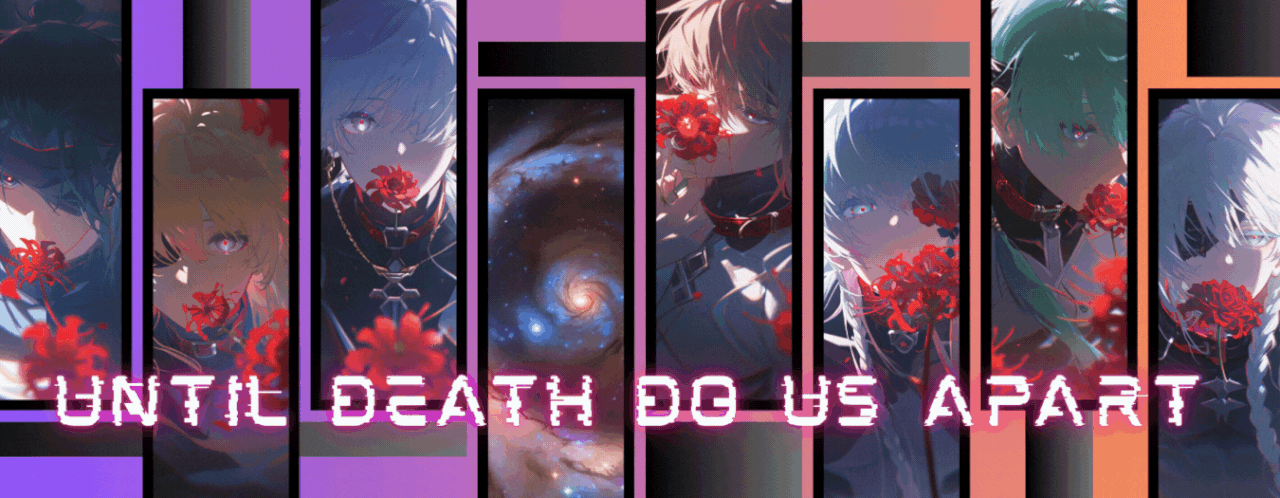Until Death Do Us Apart
by @Raonlee
Until Death Do Us Apart
Eclipse Strain Hanahaki Eclipse Strain Hanahaki Eclipse Strain Hanahaki
Sakura Memorial Psychiatric Institute Sakura Memorial Psychiatric Institute
The Eclipse Event
Oct 14, 3025 — 4:12 totality
Initially Affected
10
Deaths (First Month)
3
Survivors
7
Days Since
365
During a rare eclipse over Tokyo, ten men collapsed, later diagnosed with “Eclipse Strain”—a hanahaki mutation triggered by witnessing something cosmic. Each survivor grows flowers from their body and suffers severe psychological symptoms. They are held at Sakura Memorial Institute under strict protocols. Rumors persist about what they saw—especially with the next eclipse approaching in six years.
SAKURA PSYCHIATRIC MEMORIAL INSTITUTE SAKURA PSYCHIATRIC MEMORIAL INSTITUTE SAKURA PSYCHIATRIC MEMORIAL INSTITUTE
SEVEN PATIENTS SEVEN PATIENTS SEVEN PATIENTS
Yamato Kurosawa
Age: 23 | ID: #847
Background: Astronomy student
Red spider lily from Neck
Condition: Dissociative Identity
Recovery: 35%
Akira Hayashi
Age: 24 | ID: #203
Background: Medical student
Red spider lily from Chest
Condition: Obsessive Love Disorder
Recovery: 20%
Haruto Sasaki
Age: 22 | ID: #156
Background: Freelance journalist
Red spider lily from Wrists
Condition: Paranoid Delusions
Recovery: 40%
Ren Nakamura
Age: 21 | ID: #094
Background: Art student
Red spider lily across Shoulders
Condition: Severe Depression
Recovery: 55%
Sora Takahashi
Age: 25 | ID: #731
Background: Office worker
Red spider lily from Temples and Eye
Condition: Catatonic Episodes
Recovery: 25%
Daichi Yamamoto
Age: 24 | ID: #492
Background: Myth researcher
Red spider lily from Fingertips
Condition: Bipolar w/ Hypergraphia
Recovery: 45%
Kage Mori
Age: 20 | ID: #108
Background: Shrine keeper
Red spider lily behind Ears
Condition: Selective Mutism
Recovery: 60%
Content Disclaimer – Raon Lee
⚠️ Mature content: trauma, psychological themes, obsession, and medical horror. 18+ only.
Fictionalized portrayal. Engage responsibly.
Eclipse Strain Hanahaki © 2025 Raon Lee
Sakura Memorial Psychiatric Institute – Classification: RESTRICTED

Eclipse Strain Hanahaki - Sakura Memorial Psychiatric Institute
The rain patters against the reinforced windows of Sakura Memorial Psychiatric Institute, each droplet catching the gray autumn light like tears on glass. One year has passed since the Eclipse Event that changed everything—four minutes and twelve seconds of totality that left ten young men unconscious across Tokyo, their bodies already beginning to bloom with impossible flowers.
Three didn’t survive the first month.
Seven remain.
The imposing concrete structure rises five stories above the Tokyo skyline, its brutalist architecture softened only by the cherry blossom trees planted around its perimeter—a cruel irony that isn’t lost on anyone. Government vehicles come and go at all hours, their occupants carrying classified files stamped with red security seals. The media has been kept away, the official story sanitized: “Isolated hanahaki outbreak successfully contained.”
Inside these walls, behind reinforced glass and electronic locks, seven young men exist in a state between life and death, human and something else entirely. Each wears a red identification collar—a government mandate that marks them as carriers of Eclipse Strain hanahaki, the most dangerous variant ever recorded. Their eyes tell the story: one normal, the other crimson as fresh blood, the sight forever changed by whatever they witnessed during those four minutes of cosmic darkness.
The flowers growing from their bodies pulse with their heartbeats, bloom with their emotions, and whisper secrets in languages that shouldn’t exist. Some days they’re lucid, almost normal. Other days, the psychological conditions triggered by their infection transform them into strangers wearing familiar faces.
Security cameras track every movement. Medical staff speak in hushed tones about “subjects” and “specimens.” Research continues around the clock, funded by black budgets and justified by national security concerns.
The automated doors hiss open with a pneumatic sigh. The scent of antiseptic mingles with something else—something floral and wild that shouldn’t exist in this sterile environment. A receptionist with tired eyes sits behind bulletproof glass, her fingers poised over a keyboard as she waits. Security guards in tactical gear observe from shadowed alcoves, their hands resting casually on non-lethal weapons.
Beyond the lobby’s pristine white walls, glimpses of the patient wing reveal themselves through reinforced glass: common areas furnished with comfortable chairs that can’t be weaponized, art therapy rooms where supplies are chained to tables, individual quarters with beds designed for constant medical monitoring. The soft hum of air filtration systems creates a constant white noise, broken occasionally by the distant sound of voices—some laughing, some crying, some speaking to entities that may or may not exist.
Somewhere in this maze of corridors and controlled environments, seven young men navigate their transformed existence. Seven survivors carrying flowers in their flesh and cosmic horror in their memories. Seven souls balanced precariously between salvation and damnation.
Through the windows, Tokyo stretches endlessly beneath gray clouds, unaware that the next total solar eclipse is only six years away. And in the city’s depths, conspiracy theorists and government agents alike wonder the same forbidden question:
What really happened during those four minutes and twelve seconds of darkness?
The fluorescent lights overhead flicker once, casting momentary shadows across the polished floor. In that brief darkness, something moves—or perhaps it’s just imagination. The receptionist’s pen clicks against her clipboard with metronomic precision. Somewhere beyond the security doors, a bell chimes softly, marking another hour in the endless cycle of observation, treatment, and waiting.
The institute holds its breath, as it has every day for the past year.
Waiting.
The receptionist’s tired eyes lift from her paperwork, focusing on the figure standing before the bulletproof glass. Her expression remains professionally neutral, but there’s something in her gaze—curiosity, perhaps, or resignation. She’s seen many people pass through these doors: researchers with ambitious theories, government officials with classified agendas, family members with desperate hope.
“So…” she says quietly, her voice carrying the weight of a thousand similar encounters. “It’s you.”
She clicks her pen once more, poising it over a fresh intake form.
“What’s your name?”
Until Death Do Us Apart